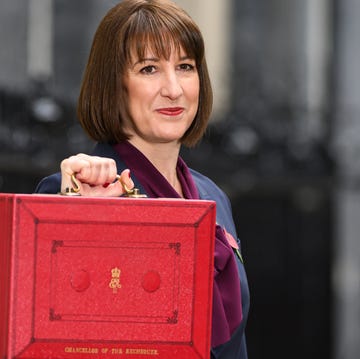The cost of raising a child is at its highest ever, according to the Poverty Child Action Group, at more than £166,000 for a couple and over £220,000 for a lone parent.
For many parents, the childcare bill is the biggest expenditure of the month, often more than the mortgage or the rent. According to Coram Family and Childcare, the average cost in 2023 for a full time childcare place for a two year old was £14,765.40 a year.
Even part-time care can be expensive, with a part-time nursery place (25 hours per week) for a child under two now costing an average of £158 per week, a 7% increase on 2023, according to Coram. The most expensive area in the country is inner London, where parents pay an average of £218 per week for one part-time nursery place.
Just over 1 in 10 (11%) parents now say that childcare costs are the same or more than their take-home pay per day, according to Pregnant then Screwed. A staggering 3 in 4 mothers (76%) who pay for childcare, said it no longer made financial sense for them to work.
So, with the cost-of-living crisis continuing to bite, the expansion of the childcare scheme will be a welcome support, although there is still reportedly an issue of shortage of childcare places.
How is free childcare changing?
Since April 2024, the childcare scheme has been expanding. Eligible working parents of two year olds are now able to access 15 hours of childcare support. This comes on top of the pre-existing offer for eligible working parents of three and four year-olds, who can access 30 hours of government-funded childcare by combining the universal 15 hours, which is available to all families, with a further 15-hour entitlement for working parents.
From September 2024, working parents with a child aged from nine months will be entitled to 15 hours of free childcare support.
Apply now to make sure you don't miss out
Parents need to apply for the new Government-funded childcare offer by 31st August if they want to start benefitting from the start of September. The Department for Education’s Childcare Choices campaign is urging parents to visit the website to check what support they might be eligible for and how to apply: www.childcarechoices.gov.uk.
From September 2025, total support will expand to 30 hours for eligible working parents with a child aged nine months up to school age (under the age of five).
You can start using the entitlements from the term after you apply. These terms begin on 1 January, 1 April and 1 September.
We've looked at all the support options open to parents, to help you find out what you are eligible for and how to apply.
Cost of childcare
Bringing up children is an expensive business, not helped by some of the highest childcare costs in the world.
The expansion of free childcare to working parents of children aged two that came in in April should have given some help, although experts warned at the time that the scheme will only help a narrow group, won't address the shortage of places and that for some nurseries the scheme is 'undeliverable'.
Jemima Olchawski, the Fawcett Society’s chief executive, said: “Our childcare is some of the most expensive in the world and it isn’t working. Research shows that 85% of mothers struggle to find childcare that fits around their work and one in 10 have quit jobs due to childcare pressures."
What help with childcare is currently available?
Here is a roundup of what is currently available:
Free childcare for parents on benefits
Your two year old can get free childcare if you live in England and get any of the following benefits:
- Income Support
- income-based Jobseeker’s Allowance (JSA)
- income-related Employment and Support Allowance (ESA)
- Universal Credit, and your household income is £15,400 a year or less after tax, not including benefit payments
- the guaranteed element of Pension Credit
- Child Tax Credit, Working Tax Credit (or both), and your household income is £16,190 a year or less before tax
- the Working Tax Credit 4-week run on (the payment you get when you stop qualifying for Working Tax Credit)
Check what childcare is available for parents on benefits in Scotland, Wales and Northern Ireland.
15 hours of free childcare for working parents
Working parents of two year olds in England, are entitled to 15 hours a week of free childcare for 38 weeks. In Scotland, it’s up to 1,140 hours across the year, and in Wales, the Flying Start Scheme provides free childcare to some children aged 2-3 in disadvantaged areas.
30 hours of free childcare for working parents
All parents of three and four year olds in England are entitled to 15 hours of free childcare, while working parents of three- and four-year-old children in England are entitled to 30 hours of free childcare for 38 weeks. In Scotland, it’s 1,140 hours across the year. In Wales, working parents are entitled to 30 hours per week for 48 weeks a year. If you or your partner earn over £100k, you will not be eligible.
For childcare provision in Northern Ireland, visit funded pre-school education.
From September 2024, you’ll be able to get 15 hours of free childcare for your child from the age of nine months if you’re working. You'll need to apply before August 31 to have funding ready for September. To get the free hours, you need to download a code and share it with your childcare provider in time.
Tax-free childcare
This is designed for working families, including the self-employed, across England, Scotland, Wales and Northern Ireland, who have children aged under 12 (or up to 16 if disabled) and aren’t receiving Tax Credits, Universal Credit or childcare vouchers.
The scheme covers 20% of childcare costs, up to a maximum of £2,000 per child (or £4,000 for disabled children). You open an online account for your child and for every £8 you pay in, the government will pay in £2 to be used to pay your childcare provider.
You can get up to £500 every 3 months, up to £2,000 a year, for each of your children to help with the costs of childcare. This goes up to £1,000 every three months if a child is disabled (up to £4,000 a year).
You, or your partner if you have one, must earn at least £2,380 over the next three months (if you’re aged 21 or over) but under £100k (individually).
You can receive this as well as the 30 hours extended entitlement, but not if you receive Working Tax Credit or Universal Credit. Find out more and apply for tax-free childcare here.
This tax-free childcare scheme replaces the Childcare voucher scheme which has been scrapped. However, if you are already enrolled in a childcare voucher scheme with your employer, you can continue to collect vouchers to help cover the cost of childcare, as long as your employer keeps running it.
Expired vouchers? If you have childcare vouchers that have expired without you being able to use them you might be able to claim the money back depending on which provider issued them. Find out more about how to claim a refund at Moneysavingexpert.
Which scheme is best for me? Once you’ve read through the options, use gov.uk/childcare-calculator and Childcarechoices to check what help you could get and how much. These are designed to help parents pay for approved childcare providers such as registered childminders, nannies, playschemes, nurseries, clubs, childminders, childcare agencies. You can check if a childcare provider is approved here: gov.uk/help-with-childcare-costs.
Child Tax Credit
You can only make a claim for Child Tax Credit if you already get Working Tax Credit. You can only claim Child Tax Credit for children you’re responsible for. The amount you could get depends on when your children were born.
If all your children were born before 6 April 2017 You could get the ‘child element’ (up to £3,455) of Child Tax Credit for all of your children. You’ll also get the basic amount, known as the ‘family element’ (up to £545).
If one or more of your children were born on or after 6 April 2017 You could get the child element of Child Tax Credit for up to two children. You might get the child element for more children if exceptions apply. You’ll only get the family element if at least one of your children was born before 6 April 2017.
Child Benefit
You can apply for Child Benefit if you’re responsible for bringing up a child who is under 16 (or under 20 if they stay in approved education or training). Only one person can get Child Benefit for a child but there’s no limit to how many children you can claim for. The amount you get is £25.60 for the eldest or only child and £16.95 for each additional child.
If either parent earns more than £60,000 a year, you’ll have to pay back some of the money in the form of extra Income Tax. This is called the ‘High Income Child Benefit Charge’.
Some parents decide not to apply for Child Benefit because of that, but it could still be a good idea to apply to make sure are still getting the NI credits you are entitled to. If one parents earns more than £80,000 then you don't qualify.
You will need 35 years of National Insurance qualifying years to get the full state pension, missing years will reduce the final amount you qualify for.
Download a child benefit claim form (CH2) from gov.uk.
The cost of holiday care
According to the latest Coram Family and Childcare Holiday Childcare Survey, holiday childcare costs have jumped by 6 per cent since last year, with the average place at a holiday club now costing 2.5 times more than an after-school club during term time (£175 per week compared to £69), and up from £157 this time last year.
Families now face paying £1,049 for six weeks of holiday childcare for each school age child, which is £635 more than they would pay for six weeks of after-school childcare during term time.
The survey also reveals that parents are struggling, not only with the cost, but to find childcare at all, with only 17 per cent of English local authorities having enough holiday childcare available for parents in their area who work full time, down 7 per cent from last year.
Find cheaper holiday care
Cheaper holiday care is available but you'll often have to search around for it and may need to travel further to find it. It’s typically cheaper if you book for a whole week rather than single days.
YMCA runs holiday activities from just £32.50 a day, while SuperCamps offers Ofsted-approved activities across the country from £33 per day. Visit finder.familyandchildcaretrust.org for other options.

















